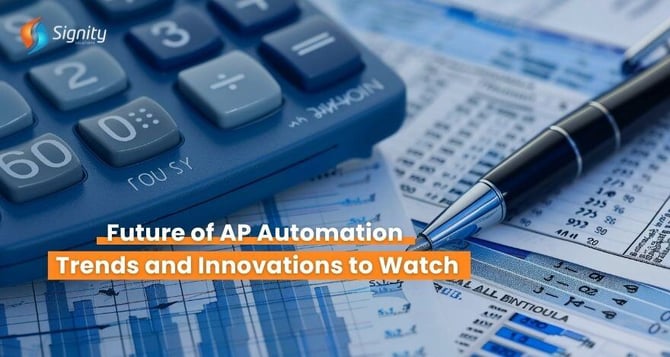The Future of AP Automation: Trends and Innovations to Watch
Discover the future of accounts payable with this comprehensive guide. Learn how emerging trends like AI, ML, and automation are transforming the industry, boosting efficiency, and driving cost savings.

Business processes all around the world have gone through many digital transformations. Some of the key reasons are a focus on remote work, more emphasis on sustainable objectives, digital adoption, and the global pandemic crisis.
This has led to the advent of accounts payable automation. Technologies like artificial intelligence and machine learning have led to innovations like automated invoice processing, workflow automation with the help of RPA (Robotic Process Automation) and voice payments, and more sustainable practices.
It’s natural to wonder about the future of RPA in accounts payable automation in the upcoming years. This blog will explore the various future trends expected in this domain and how they will benefit users.
Do you know that Gartner has predicted the accounts payable automation market to reach $1.75 billion by 2026 at a CAGR of 14%?
Let’s get started.
Key Takeaways
- According to Gartner, the AP automation market is expected to reach $1.75 bn by 2026 at a CAGR of 14%.
- AI and ML in the accounts payable industry help improve efficiency and help in predictive analysis.
- Cloud-based AP solutions and voice-activated payments help improve the security and accessibility of finance.
- AP automation encourages sustainable practices by reducing the usage of paper and the generation of waste materials.
AP Automation Trends in 2024
The accounts payable industry has traditionally grappled with challenges such as manual data entry, error-prone processes, invoice processing delays, and limited accessibility.
AP automation has emerged as a powerful solution to overcome these hurdles.
Let us now go through each one of these in detail.

1. Rise of Artificial Intelligence and Machine Learning (AI/ML)
AI has been a game-changer in the accounts payable industry for nearly a decade, revolutionizing processes like invoice processing and reducing errors significantly. Beyond basic automation, AI and ML offer a multitude of benefits:
- Anomaly Detection: AI can identify unusual patterns in financial data, flagging potential fraudulent activities like duplicate invoices or vendor discrepancies.
- Natural Language Processing (NLP): NLP enables AI systems to extract data from unstructured documents like invoices, purchase orders, and contracts with high accuracy.
- Predictive Modeling: By analyzing historical data, AI can forecast cash flow, predict payment delays, and optimize discount opportunities.
- Robotic Process Automation (RPA): While not strictly AI, RPA works in tandem with AI to automate repetitive tasks like data entry, invoice matching, and approval routing.
These applications collectively enhance efficiency, accuracy, and decision-making within the AP department.
2. Cloud-Based AP Solutions
Cloud-based AP solutions offer unparalleled flexibility, scalability, and cost-effectiveness. By outsourcing IT infrastructure, businesses can focus on core competencies while enjoying 24/7 accessibility and reduced upfront costs.
Key benefits of cloud-based AP:
- Enhanced collaboration: Real-time access and shared workflows improve team productivity.
- Improved vendor relationships: Seamless communication and efficient interactions with suppliers.
- Strong security and compliance: Leading cloud providers invest heavily in data protection and adhere to industry standards.
- Rapid implementation: Quick setup and minimal IT involvement.
When selecting a cloud-based AP solution, consider factors like invoice processing speed, accuracy, security features, and integration capabilities with your existing systems. Popular options include NetSuite, Acumatica, Microsoft Dynamics 365, and SAP.
3. AP Digital Transformation
AP automation is a cornerstone of digital transformation, enabling organizations to streamline processes, improve visibility, and drive strategic decision-making. By automating manual tasks and leveraging advanced technologies, businesses can:
- Accelerate invoice processing: Reduce cycle times and improve cash flow.
- Enhance accuracy: Minimize errors and exceptions.
- Strengthen compliance: Ensure adherence to financial regulations.
- Gain valuable insights: Utilize data analytics to uncover trends and optimize spending.
Digital transformation also extends to supplier relationships, enabling closer collaboration and early payment discounts.
4. Enhanced Data Analytics in AP Automation
Compiling the raw data manually was a big challenge for organizations. They had to pull the data from multiple sources, like spreadsheets. The firms had to keep track of all the paper invoices. Sometimes, the data would be incomplete, and the predictions were pretty inaccurate.
Benefits of Enhanced Data Analytics:
- Spend Data Analysis: Identify your best vendors, analyze departmental spending trends, and uncover opportunities for cost savings by negotiating better deals or switching to more economical options.
- Category AP Data Analysis: Gain deeper insights into payment information, identify trends that might affect your bottom line, improve overall process accuracy, and optimize workflows.
- Payment Data Analysis: Track invoice processing speeds, predict turnaround times and facilitate timely payments that leverage potential early payment discounts. This helps build stronger relationships with suppliers and improve cash flow management.
AP automation tools equipped with advanced analytics empower businesses to:
- Make data-driven decisions: Move beyond assumptions and leverage concrete data to optimize spending, identify cost-saving opportunities, and improve supplier relationships.
- Gain real-time visibility: Access real-time insights into your AP process, enabling proactive decision-making and improved efficiency.
- Predict future trends: Use historical data to forecast future payment trends, anticipate potential cash flow challenges, and optimize working capital.
Enhanced data analytics is a key component of AP automation, driving significant value and strategic insights in the financial management process.
5. Digital Payments and Virtual Credit Cards
Digital Payments revolutionize the AP process by facilitating secure and efficient electronic fund transfers. Gone are the days of issuing paper checks.
Benefits of Digital Payments in AP:
- Enhanced Security: Strong encryption and multiple layers of security protocols help mitigate fraud risks associated with paper checks.
- Improved Efficiency: Streamline invoice payments with instant processing, eliminating the delays and manual effort associated with traditional methods.
- Global Payment Capabilities: Easily facilitate international payments to vendors located anywhere in the world.
- Improved Supplier Relationships: Foster stronger relationships with vendors through faster payments and improved communication.
Virtual Credit Cards (vCards) represent one of the most innovative and secure digital payment solutions within AP automation.
How Virtual Credit Cards Work:
- Utilize a unique, randomly generated 16-digit number for a single transaction.
- Offer enhanced security by eliminating the risk of lost or stolen physical cards.
- Facilitate instant electronic payments, eliminating processing delays.
- Mitigate the risk of duplicate payments, a common challenge in manual AP processes.
The virtual credit card market is projected to reach a staggering $13.8 trillion by 2028. This rapid growth signifies the growing adoption of this secure and efficient payment method within AP departments.
Virtual credit cards offer a powerful solution for secure, efficient, and streamlined invoice payments within the AP process.
Are You Ready to Revolutionize Your AP Process?
Discover how robotic process automation can streamline your AP tasks and enhance efficiency.
6. Adaptive Fraud Detection with AI
AI plays a critical role in AP automation, enhancing financial security by proactively detecting fraudulent activity. Here's how AI-powered adaptive fraud detection works:
- Analyzing Invoice Data: AI meticulously scrutinizes invoice data, searching for anomalies and inconsistencies.
- Identifying Potential Threats: AI algorithms utilize sophisticated pattern recognition techniques to flag potentially fraudulent activities such as duplicate invoices or altered payment information.
- Proactive Threat Detection: AI systems operate continuously, offering real-time monitoring and detection of fraudulent attempts.
By leveraging AI, businesses can significantly reduce the risk of fraud in their AP processes, ensuring financial security and peace of mind.
7. Compliance Innovations
AI-powered AP automation is a game-changer when it comes to compliance. By automating the recording and cross-verification of transactions, AI ensures adherence to complex regulatory frameworks.
Benefits of AI in Compliance:
- Real-time monitoring: AI systems continuously monitor transactions for compliance risks, enabling early detection and mitigation.
- Enhanced audit readiness: AI-generated data and reports provide auditors with clear and accessible information, streamlining the audit process.
- Improved vendor risk management: By tracking key performance indicators like quality, payment history, and delivery time, AI helps identify and mitigate risks associated with vendors.
AI-driven compliance automation empowers businesses to:
- Reduce compliance risks: Proactively identify and address potential compliance issues.
- Optimize resources: Streamline compliance processes and free up staff for strategic initiatives.
- Build trust: Demonstrate a strong commitment to regulatory compliance
8. Sustainable and Green AP Practices
AP automation plays a pivotal role in driving sustainability initiatives. By eliminating paper-based processes, businesses can significantly reduce their environmental impact.
Benefits of Sustainable AP Practices:
- Reduced paper consumption: E-invoicing and digital document management eliminate the need for paper, saving trees and reducing waste.
- Lower carbon footprint: Digital processes reduce energy consumption and transportation emissions associated with paper-based workflows.
- Cost savings: Streamlined processes and reduced paper usage lead to lower operational costs.
Key elements of sustainable AP:
- E-invoicing: Adopt electronic invoicing to eliminate paper-based processes.
- Digital document management: Store and manage documents electronically to reduce paper storage needs.
- Cloud-based solutions: Leverage cloud technology for reduced energy consumption and data center footprint.
By embracing sustainable AP practices, businesses can contribute to a greener planet while improving efficiency and reducing costs.
9. OCR Technology
Optical Character Recognition (OCR) is a powerful tool for automating invoice data extraction. By converting scanned documents into editable text, OCR significantly speeds up the AP process.
Benefits of OCR:
- Accelerated invoice processing: Reduce manual data entry time and errors.
- Improved accuracy: OCR systems can accurately extract invoice data, minimizing human error.
- Enhanced efficiency: Streamline the entire AP workflow by automating data capture.
10. Better Cash Flow Management
AP automation is instrumental in optimizing cash flow. By Automating invoice processing, automating payments, and providing real-time visibility into financial data, businesses can:
- Accelerate invoice processing: Reduce payment cycle times and improve cash flow.
- Take advantage of early payment discounts: Identify opportunities to maximize savings.
- Improve cash forecasting: Use data analytics to predict cash flow trends and manage working capital effectively.
- Reduce late payment penalties: Ensure timely payments to avoid penalties and maintain good supplier relationships.
By implementing AP automation, businesses can significantly enhance their cash flow management capabilities and improve overall financial performance.
11. Voice-Activated Payment Solutions
Voice-activated payment solutions are revolutionizing the way we interact with our finances. By leveraging natural language processing (NLP), these systems enable users to make payments, check balances, and manage their money through simple voice commands.
Key benefits of voice payments:
- Convenience: Users can initiate payments on the go without the need for physical cards or mobile apps.
- Accessibility: Voice payments cater to individuals with disabilities or limited tech proficiency.
- Enhanced security: Biometric authentication like fingerprint or voice recognition adds an extra layer of protection.
- Seamless integration: Voice payments can be integrated with smart home devices and virtual assistants for a cohesive user experience.
The future of voice payments holds immense potential. As technology continues to advance, we can expect even more sophisticated and secure voice-activated payment solutions to emerge.

What Does the Future of Accounts Payable Industry Look Like?
The future of the accounts payable industry is closely linked to developments in Artificial intelligence. When it comes to fraud analysis, AI will revolutionize the process with the aid of advanced pattern recognition. AI's predictive capabilities will help generate reports on current financial needs and future customer behavior.
Some of the key areas in which AI will work its charm in the future are business analytics, online security, and taking care of customer queries regarding payments.
Now, let us see what the first step for a firm should be while going for AP automation.
Conclusion
The future of accounts payable is undeniably tied to automation. With advancements in AI, ML, and cloud technologies, organizations are presented with unparalleled opportunities to streamline operations, enhance efficiency, and mitigate risks.
By embracing AP automation, businesses can unlock valuable insights from their financial data, improve cash flow management, and strengthen their competitive position. However, implementing a comprehensive AP automation strategy can be complex.
We offer expert guidance and tailored solutions to help organizations navigate the AP automation journey. Our team of experts can assess your specific needs, recommend the right technologies, and implement a robust AP automation system that delivers measurable results.
Contact us today to learn more about how Signity Solutions can help you transform your accounts payable function.


%201-1.webp)


.png?width=344&height=101&name=Mask%20group%20(5).png)


















